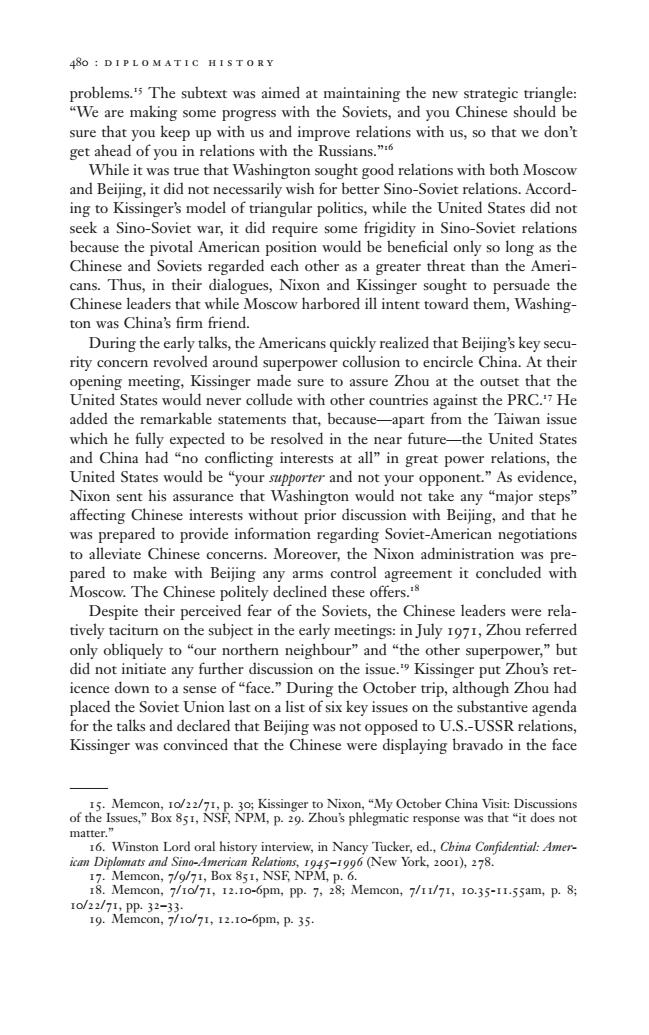正在加载图片...

480:DIPLOMATIC HISTORY problems.'5 The subtext was aimed at maintaining the new strategic triangle: "We are making some progress with the Soviets,and you Chinese should be sure that you keep up with us and improve relations with us,so that we don't get ahead of you in relations with the Russians."16 While it was true that Washington sought good relations with both Moscow and Beijing,it did not necessarily wish for better Sino-Soviet relations.Accord- ing to Kissinger's model of triangular politics,while the United States did not seek a Sino-Soviet war,it did require some frigidity in Sino-Soviet relations because the pivotal American position would be beneficial only so long as the Chinese and Soviets regarded each other as a greater threat than the Ameri- cans.Thus,in their dialogues,Nixon and Kissinger sought to persuade the Chinese leaders that while Moscow harbored ill intent toward them,Washing- ton was China's firm friend. During the early talks,the Americans quickly realized that Beijing's key secu- rity concern revolved around superpower collusion to encircle China.At their opening meeting,Kissinger made sure to assure Zhou at the outset that the United States would never collude with other countries against the PRC.7 He added the remarkable statements that,because-apart from the Taiwan issue which he fully expected to be resolved in the near future-the United States and China had "no conflicting interests at all"in great power relations,the United States would be"your supporter and not your opponent."As evidence, Nixon sent his assurance that Washington would not take any "major steps" affecting Chinese interests without prior discussion with Beijing,and that he was prepared to provide information regarding Soviet-American negotiations to alleviate Chinese concerns.Moreover,the Nixon administration was pre- pared to make with Beijing any arms control agreement it concluded with Moscow.The Chinese politely declined these offers.s Despite their perceived fear of the Soviets,the Chinese leaders were rela- tively taciturn on the subject in the early meetings:in July 197I,Zhou referred only obliquely to"our northern neighbour"and "the other superpower,"but did not initiate any further discussion on the issue."9 Kissinger put Zhou's ret- icence down to a sense of "face."During the October trip,although Zhou had placed the Soviet Union last on a list of six key issues on the substantive agenda for the talks and declared that Beijing was not opposed to U.S.-USSR relations, Kissinger was convinced that the Chinese were displaying bravado in the face 15.Memcon,Io/22/71,p.3o;Kissinger to Nixon,"My October China Visit:Discussions of the Issues,"Box 851,NSF,NPM,p.29.Zhou's phlegmatic response was that"it does not natter.” 16.Winston Lord oral history interview,in Nancy Tucker,ed.,China Confidential:Amer- ican Diplomats and Sino-American Relations,1945-1996 (New York,2001),278. 17.Memcon,7/9/71,Box 851,NSE,NPM,p.6. 18.Memcon,7/1o/71,12.10-6pm,pp.7,28;Memcon,7/11/71,10.35-11.55am,p.8; Io/22/71,Pp.32-33 1g.Memcon,7/1o/71,12.Io-6pm,P.35-problems.15 The subtext was aimed at maintaining the new strategic triangle: “We are making some progress with the Soviets, and you Chinese should be sure that you keep up with us and improve relations with us, so that we don’t get ahead of you in relations with the Russians.”16 While it was true that Washington sought good relations with both Moscow and Beijing, it did not necessarily wish for better Sino-Soviet relations. According to Kissinger’s model of triangular politics, while the United States did not seek a Sino-Soviet war, it did require some frigidity in Sino-Soviet relations because the pivotal American position would be beneficial only so long as the Chinese and Soviets regarded each other as a greater threat than the Americans. Thus, in their dialogues, Nixon and Kissinger sought to persuade the Chinese leaders that while Moscow harbored ill intent toward them, Washington was China’s firm friend. During the early talks, the Americans quickly realized that Beijing’s key security concern revolved around superpower collusion to encircle China. At their opening meeting, Kissinger made sure to assure Zhou at the outset that the United States would never collude with other countries against the PRC.17 He added the remarkable statements that, because—apart from the Taiwan issue which he fully expected to be resolved in the near future—the United States and China had “no conflicting interests at all” in great power relations, the United States would be “your supporter and not your opponent.” As evidence, Nixon sent his assurance that Washington would not take any “major steps” affecting Chinese interests without prior discussion with Beijing, and that he was prepared to provide information regarding Soviet-American negotiations to alleviate Chinese concerns. Moreover, the Nixon administration was prepared to make with Beijing any arms control agreement it concluded with Moscow. The Chinese politely declined these offers.18 Despite their perceived fear of the Soviets, the Chinese leaders were relatively taciturn on the subject in the early meetings: in July 1971, Zhou referred only obliquely to “our northern neighbour” and “the other superpower,” but did not initiate any further discussion on the issue.19 Kissinger put Zhou’s reticence down to a sense of “face.” During the October trip, although Zhou had placed the Soviet Union last on a list of six key issues on the substantive agenda for the talks and declared that Beijing was not opposed to U.S.-USSR relations, Kissinger was convinced that the Chinese were displaying bravado in the face 480 : diplomatic history 15. Memcon, 10/22/71, p. 30; Kissinger to Nixon, “My October China Visit: Discussions of the Issues,” Box 851, NSF, NPM, p. 29. Zhou’s phlegmatic response was that “it does not matter.” 16. Winston Lord oral history interview, in Nancy Tucker, ed., China Confidential: American Diplomats and Sino-American Relations, 1945–1996 (New York, 2001), 278. 17. Memcon, 7/9/71, Box 851, NSF, NPM, p. 6. 18. Memcon, 7/10/71, 12.10-6pm, pp. 7, 28; Memcon, 7/11/71, 10.35-11.55am, p. 8; 10/22/71, pp. 32–33. 19. Memcon, 7/10/71, 12.10-6pm, p. 35